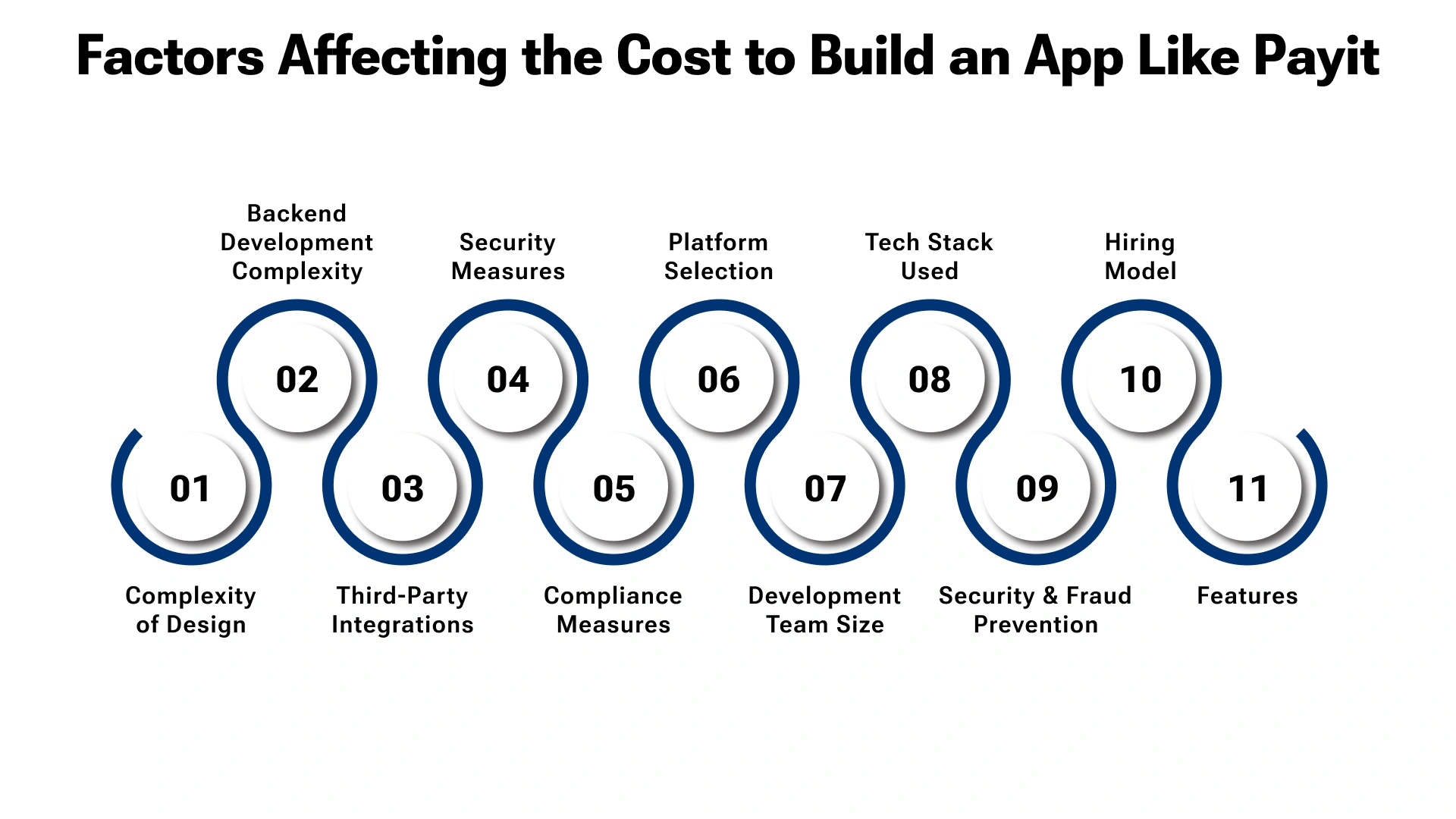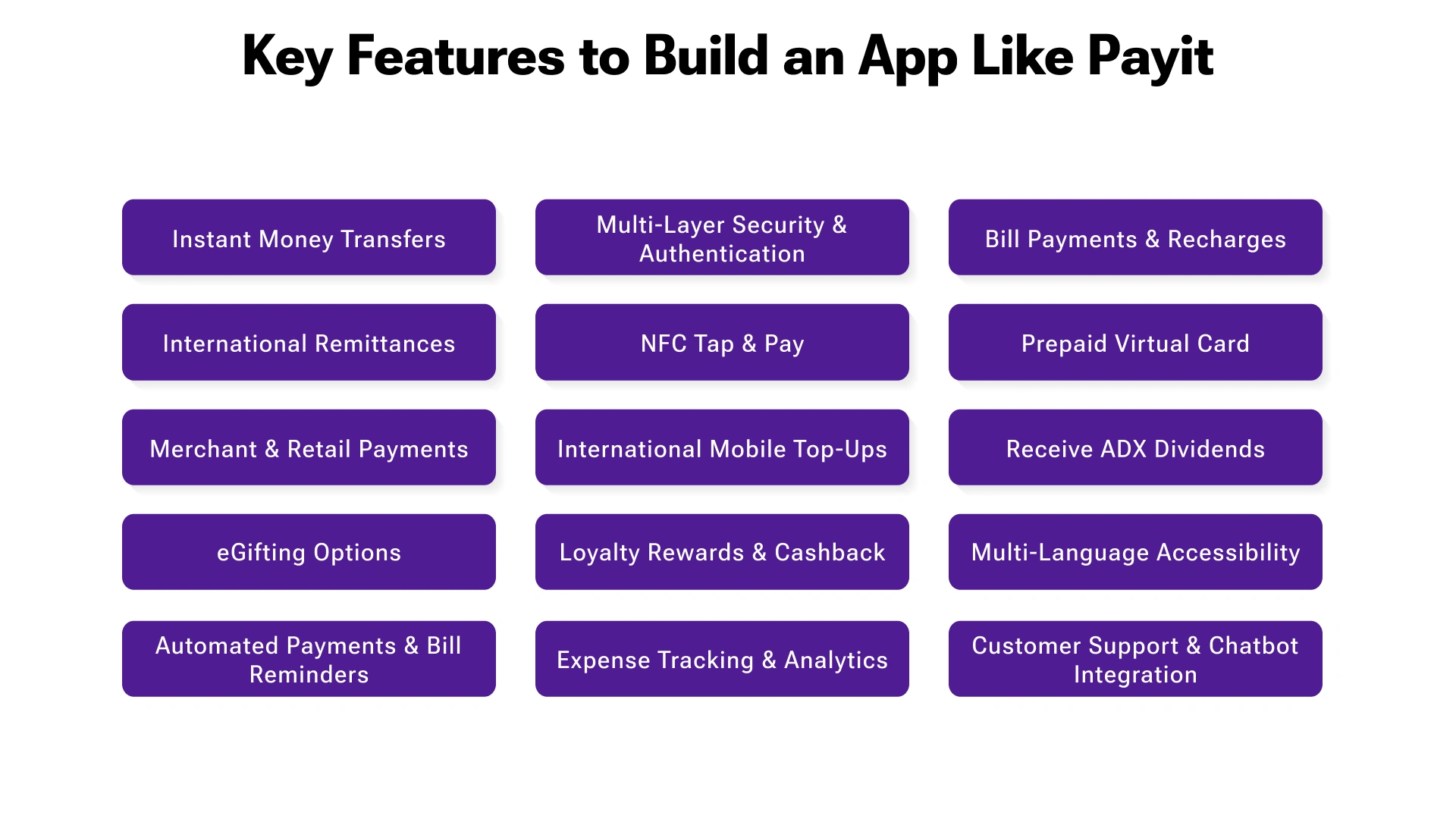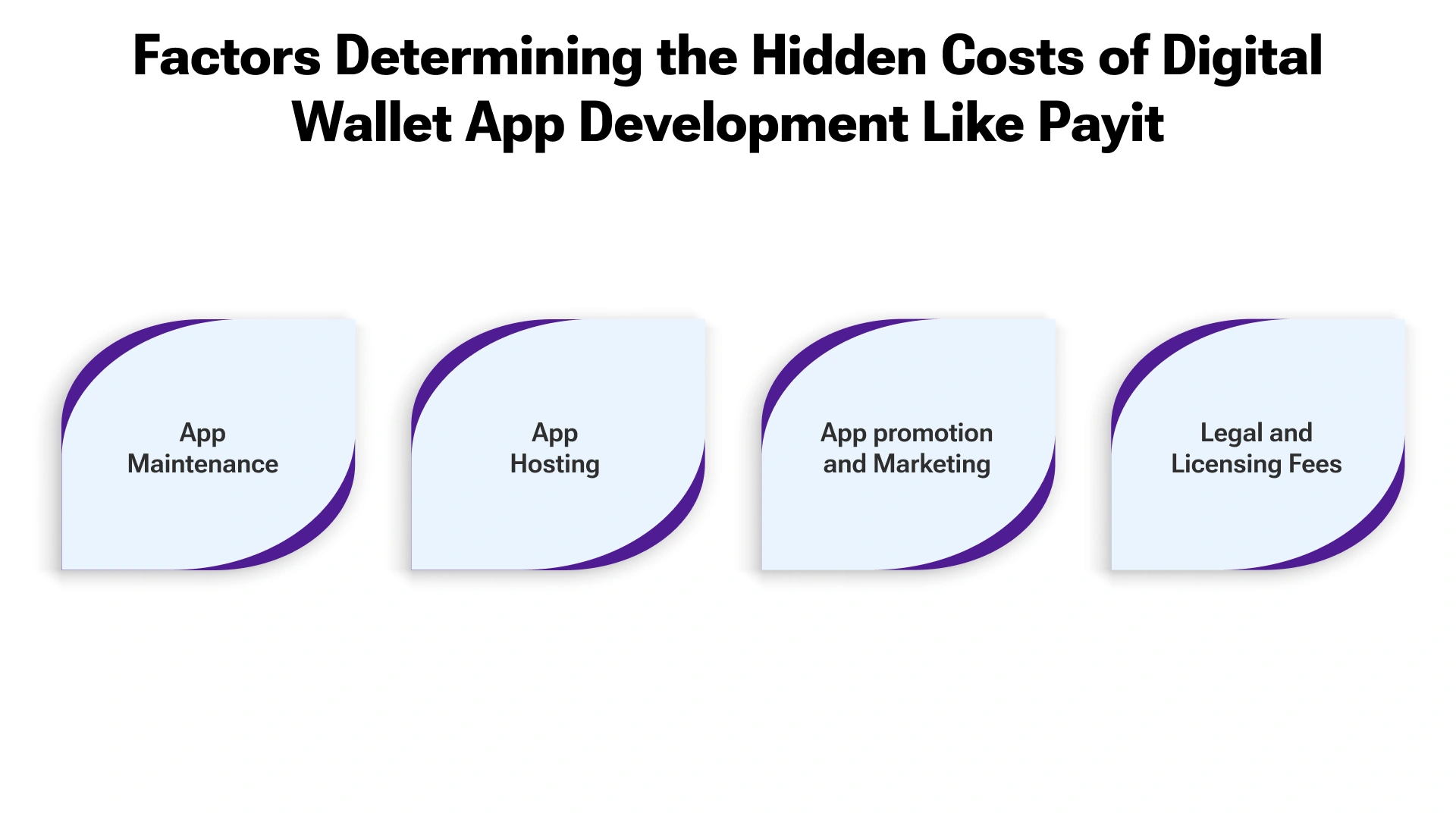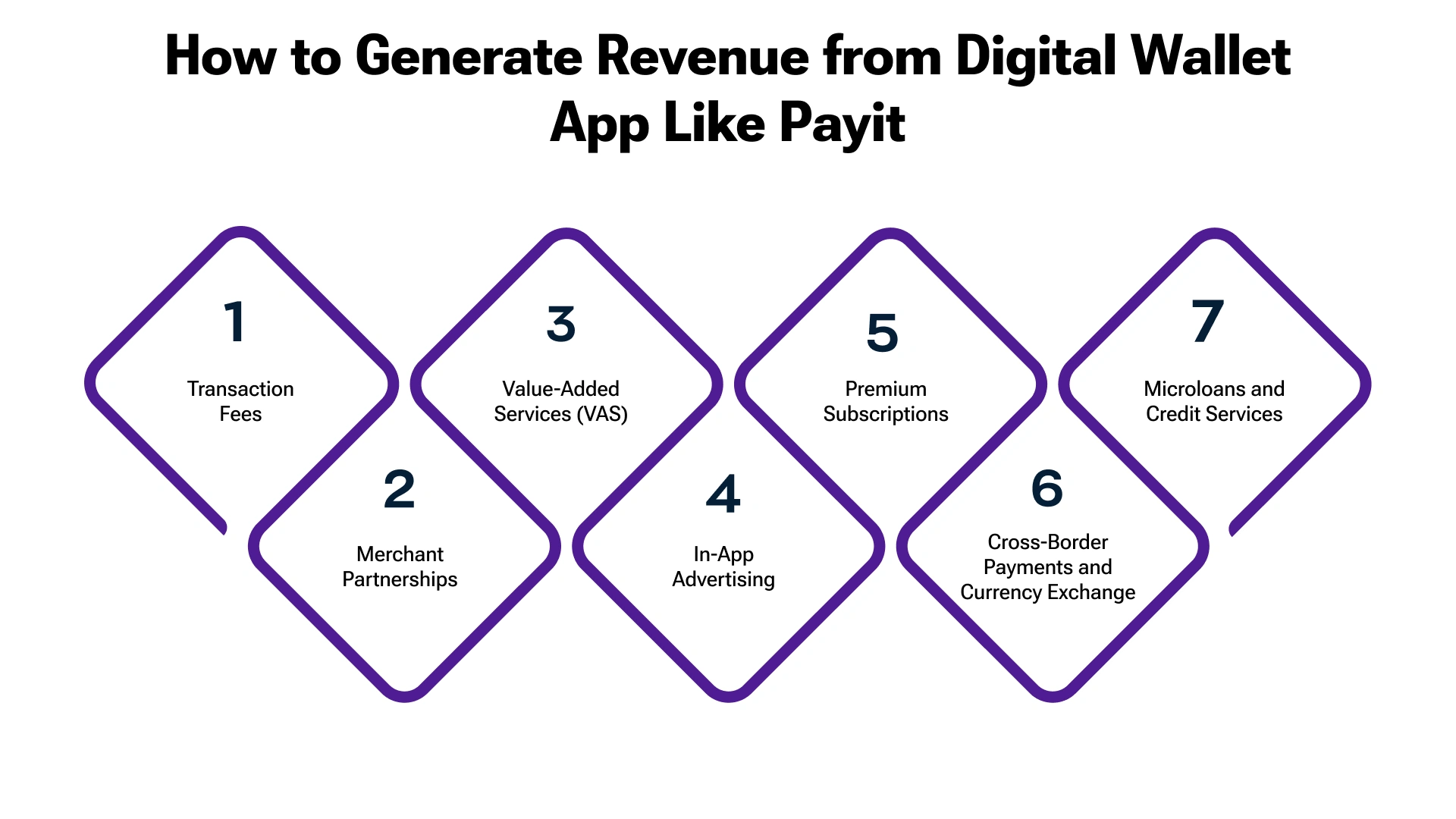More than 90% of people in the UAE now use digital payments, and mobile wallets are growing rapidly—around 35% every year. The decline of cash usage is fueling the rise of apps like Payit by FAB, pushing the UAE closer to becoming a fully cashless nation.
For business owners looking to build an app like Payit, one critical question arises:
What is the cost to build a digital wallet app like Payit?
The price typically falls within AED 88,500 and AED 600,000+ ($24,100 to $163,500+) based on different factors like features, security standards, and technical complexity.
Whether you're a startup with an innovative idea or an established business aiming to modernize your payment system, understanding the cost structure is essential.
In this blog, we’ll break down what influences digital wallet app development costs and what it takes to build a secure, user-friendly, and modern mobile wallet like Payit.
Payit: An Overview of the Digital Wallet App
First Abu Dhabi Bank (FAB) built Payit in UAE. Payit is a digital wallet app that lets people and businesses manage their daily money needs without using cash or cards.
According to Statista, the global mobile wallet app market is predicted to reach $12 trillion by 2026. These apps not only offer convenience but also help bridge the financial gap for unbanked and underbanked populations.
Countries like the UAE and Saudi Arabia are witnessing rapid adoption, with mobile wallet usage growing at a rate of 30–40% annually. Additionally:
- 60% of Gen Z and millennials prefer E-wallets over traditional banking apps.
- Over 70% of users consider security the most critical factor when selecting a digital wallet.
Some standout features that make it unique include:
- Peer-to-peer transfers using mobile numbers or QR codes
- Bill payments for utilities, mobile recharge, and more
- International remittance services
- Merchant payments at retail stores and online platforms
- Government services integration
What Is the Cost to Build a Digital Wallet App Like Payit?
The cost to develop E-wallet app in Dubai depends on features, development team location and app complexity.
Typically, the costs range from AED 88,500 and AED 600,000+ ($24,100 to $163,500+), affected by app complexity along with features and timeline.
| App Complexity | Key Features | Average Costs | Average Timeline |
| Basic App | User registration & KYC Peer-to-peer transfers (mobile number/QR) Basic UI Transaction history | AED 147,000 to AED 220,000 | 2 to 6 Months |
| Moderate App | All basic features Bill payments (utilities, mobile recharge) Merchant QR payments Notifications Basic analytics dashboard | AED 294,000 – AED 441,000 | 6 to 9 months |
| Advanced App | All moderate features International remittances Biometric security AI-based fraud detection Government service integration | AED 735,000 – AED 1,101,900 | 9 to 1.5 years or more |
A Simple Formula to Estimate the Cost to develop a secure digital wallet app in Dubai
By using the following formula, you can estimate the cost to build a digital wallet app like Payit in UAE.
Total Cost = Development Hours × Hourly Rate
At an average hourly rate of AED 184 (approximately $50), the E-wallet app cost estimation UAE would be around AED 220,800 (or $60,000).
Factors That Influence Payit Like Digital Wallet App Development Cost
Let’s explore a few factors that impact the cost to build a digital wallet app like Payit in the UAE:

Complexity of Design
Make sure UI/UX design of your digital wallet must be seamless and intuitive. Designing such an app requires proper planning to accommodate ease of navigation, multiple functionalities and a visually appealing interface.
When considering similar Payit development cost factors for digital wallet apps, remember that the more sophisticated and customized the design is, the higher the cost to build a online banking app like Payit in UAE.
Cost Comparison Based on Design Complexity:
| Basic UI/UX Design | AED 30,000 - AED 50,000 |
| Complex and Advanced UI/UX Design | AED 50,000 - AED 100,000 |
Backend Development Complexity
Another factor that impacts the cost to build a digital wallet app like Payit in UAE is robust backend of an app. It’s for handling transactions, managing user data, and ensuring smooth app operations. Robust backend includes database, server, APIs, and other core components.
More complex features such as real-time transactions, multi-user management, and detailed reporting require advanced backend architecture.
Third-Party Integrations
Integrating with third-party services (like payment gateways integration UAE, KYC/AML services, and banking APIs) can add significant Payit app development cost. Some popular services in the UAE include Stripe, PayPal, and the UAE Central Bank’s APIs.
Let’s explore the cost breakdown of the digital wallet app development based on third-party integrations:
| Third-Party Integrations | Average Costs in AED |
| Basic Integration (Single Payment Gateway) | AED 15,000 - AED 30,000 |
| Advanced Integration (GPS, Multiple APIs, Real Time Analytics | AED 30,000 - AED 60,000 |
Security Measures
Ensuring high-level security is vital for building a trusted digital wallet in the UAE. Features like data encryption, two-factor authentication (2FA), and secure payment gateways are essential to protect users.
Adhering to UAE security standards enhances the Payit app development cost. But it’s essential for the success of the digital wallet app development.
Here is a breakdown of digital wallet app development cost based on security measures:
| Security | Estimated Costs in AED |
| Basic Security Measures (SSL, Data Encryption) | AED 20,000 - AED 40,000 |
| Advanced (Biometrics, Multi-Factors Authentication, Encryption) | AED 40,000 - AED 80,000 |
Platform Selection
You must decide whether to build the best digital wallet UAE for iOS, Android, or both. Building a native app for both platforms will cost more than developing a single platform app. Choosing cross-platform frameworks (e.g., Flutter, React Native) might lower costs.
Let’s explore the cost breakdown of building digital wallet app like Payit based on chosen platform:
| Chosen Platforms | Average Costs in AED |
| Single Platform (iOS or Android) | AED 70,000 - AED 150,000 |
| Cross-Platform (iOS & Android) | AED 120,000 - AED 250,000 |
Development Team Size
The development team consists of the following;
- UI/UX designers
- mobile app developers
- backend developers
- QA engineers
- project managers
- business analysts
The size and expertise of the dedicated development team will affect the cost to develop e-wallet app in Dubai.
Here is a breakdown of Payit like digital wallet app development cost based on dedicated team (in hourly rates)
| App Development Team | Approx. Hourly Rates (in AED) |
| Project Manager | AED 102.76 to AED 110.10 ($28 to $30) |
| Tech Lead (Frontend/Backend) | AED 102.76 to AED 110.10 ($28 to $30) |
| Sr. Mobile App Developer | AED 91.75 to AED 110.10 ($25 to $30) |
| Sr. Backend Developer | AED 88.08 to AED 110.10 ($24 to $30) |
| DevOps | AED 91.75 to AED 110.10 ($25 to $30) |
| Business Analyst | AED 73.40 to AED 91.75 ($20 to $25) |
| UI/UX | AED 73.40 to AED 91.75 ($20 to $25) |
| QA | AED 73.40 to AED 91.75 ($20 to $25) |
Tech Stack Used
The mobile app development technologies (e.g., programming languages, frameworks, cloud services) can significantly influence Payit like digital wallet app development cost. Robust and secure technologies will enhance the cost to build a digital wallet app.
Here is a cost breakdown of digital wallet app development like Payit in UAE based on tech stacks utilized:
| Chosen Tech Stacks | Estimated Cost Range |
| Basic Technology (React Native, Flutter, Php) | AED 50,000 - AED 100,000 |
| Advanced Technology (Python, AI, Blockchain) | AED 100,000 - AED 200,000 |
Hiring Model
Your hiring approach plays a crucial role in determining both the speed and cost to build a digital wallet app like Payit in the UAE. An in-house team gives you complete control over projects but often comes with higher expenses.
On the other hand, outsourcing to a dedicated app development team can be more cost-effective and flexible—provided you choose a reliable partner to ensure high-quality results.
Hiring Model Comparison: In-House vs Outsourced for eWallet App Development in UAE
| Criteria | In-House Development | Outsourced Development |
| Overview | Build your own internal team for full control | Hire a dedicated external team or agency for app development |
| Advantages | Full control over team & workflow Easier alignment with internal goals Long-term product ownership | Lower cost Faster time-to-market Access to diverse expertise |
| Challenges | High recruitment & infrastructure cost Slower hiring process Less flexibility to scale | Communication or time-zone gaps Requires vendor vetting May involve IP/legal protections |
Estimated Cost (AED) AED 918,000 – AED 1,836,000 + AED 183,000 – AED 734,000
Features
The cost to develop a secure digital wallet app in Dubai increases with the integration of advanced functionalities. Features such as peer-to-peer payments, multi-currency wallets, transaction categorization, and budgeting tools demand specialized design, backend development, and thorough testing.
Each feature adds a layer of complexity, especially when customized to suit specific user behaviors or regulatory requirements. Ensuring seamless interoperability between these components further drives up digital wallet app development cost and speed.
Here’s a cost breakdown for a Payit-like digital wallet app based on features complexity:
| Features | Estimate Costs in AED |
| Basic Features (Secure logins, P2P transfers, balance tracking) | AED 110,100 – AED 183,500 |
| Advanced Features (AI chatbots, QR code payments, Real-time analytics, Multi-currency support) | AED 367,000 – AED 734,000 |
Must-Have Features of Payit Like Digital Wallet App Development
To ensure the success of multi-currency wallet app UAE like Payit, it's crucial to include features that align with modern user expectations. If you're considering the cost to build an app like Payit, integrating the right functionalities can significantly impact both user satisfaction and your return on investment.
Here are key features that play a vital role in making an app like Payit succ
essful.

- Instant Money Transfers: Allow users to send and receive money instantly using mobile numbers, QR codes or wallet IDs that boost user convenience and satisfaction.
- Multi-Layer Security & Authentication: Integrate robust security protocols such as biometric login, two-factor authentication (2FA), and end-to-end encryption to protect user data and transactions.
- Bill Payments & Recharges: Enable seamless payment of utility bills, mobile recharges, internet subscriptions and more within the app.
- School & Government Fees: Facilitate direct payments of educational and governmental fees that expand use cases and user base.
- International Remittances: Provide a secure and fast option for users to send money internationally to family and friends abroad.
- NFC Tap & Pay: Support contactless payments using NFC technology for quick checkouts at stores, public transport and retail outlets.
- Prepaid Virtual Card: Offer a virtual card linked to the wallet for online purchases, subscriptions, and spending control.
- Merchant & Retail Payments: Allow in-store and online merchant payments through QR codes, wallet numbers or integrations with POS systems.
- International Mobile Top-Ups: Enable top-up services for international mobile numbers, which is ideal for users with families in other countries.
- Receive ADX Dividends: Include features to receive and manage dividends directly from platforms like the Abu Dhabi Securities Exchange (ADX).
- eGifting Options: Let users send digital gift cards or wallet funds as gifts for birthdays, holidays, or special occasions.
- Loyalty Rewards & Cashback: Boost retention with loyalty programs, cashback offers, and promotional rewards for frequent transactions.
- Multi-Language Accessibility: Ensure the app supports multiple languages to cater to a diverse and multilingual user base.
- Automated Payments & Bill Reminders: Automate recurring bill payments and send reminders to users to help them avoid late fees and missed payments.
- Expense Tracking & Analytics: Empower users with insights into their spending patterns through detailed analytics and budget-tracking features.
- Customer Support & Chatbot Integration: Enhance user experience with 24/7 customer support such as AI-powered chatbots for instant query resolution.
What are the Hidden Digital Wallet App Development Costs Like Payit?
Developing a digital wallet UAE like Payit involves more than just the initial coding and design expenses. Several hidden expenses can significantly impact your overall cost to build a digital wallet app like Payit. Here's a breakdown of these often-overlooked expenses:

App Maintenance
Ongoing updates, bug fixes, security patches, and compatibility upgrades are essential to ensure smooth performance and user satisfaction.
Costs Include:
- OS updates (iOS, Android)
- Fixing bugs and crashes
- Performance optimization
- Adding new features over time
Estimated Annual Cost: 15–25% of the initial development cost
App Hosting
Secure and scalable cloud hosting is crucial for processing transactions, storing user data, and ensuring real-time performance.
Costs Include:
- Cloud server fees (AWS, Google Cloud, Azure)
- Load balancers, CDN, firewalls
- Database and backup storage
- Monitoring and logging tools
Estimated Monthly Cost: AED 734 – AED 7,340+ depending on user base size and usage
App Promotion & Marketing
Building an app is just the beginning—real challenge depends on getting users to download it.
Costs Include:
- App Store Optimization (ASO)
- Paid ads (Google, Facebook, Instagram)
- Influencer partnerships
- Email marketing and push notifications
Estimated Budget: AED 18,350 – AED 183,500+ (launch + ongoing)
Legal & Licensing Fees
Digital wallets must comply with strict financial regulations and data protection laws.
Costs Include:
- Licensing (for money transfers, digital payments, etc.)
- KYC/AML compliance integration
- Legal consulting
- GDPR, PCI-DSS, and data privacy compliance
Estimated Cost: AED 36,700 - AED 367,000+ (depending on geography and compliance level)
How to Optimize Digital Wallet App Development Costs like Payit
Unforeseen expenses frequently emerge during app development, including fees for third-party services, ongoing maintenance, and regulatory compliance. These hidden prices can significantly affect the overall cost to build a digital wallet app like Payit.
Let's take a closer look at these often-overlooked factors in digital wallet app development.
Launching an MVP for Quick Market Validation
Developing a MVP helps validate the app idea with a limited feature set. By focusing on core functionalities, businesses can gather real user feedback early on. This approach reduces risk, speeds up time-to-market, and prevents unnecessary spending on features that might not resonate with users.
Focus on Core Payment Features and Functionalities
Prioritize essential features such as secure transactions, user authentication, and payment integrations. By focusing on these core functionalities, you avoid feature creep and keep the app lean. This approach ensures faster development and avoids overcomplicating the project, leading to lower development and maintenance costs in the long term.
Leveraging Cross-Platform Development for Cost Savings
Using frameworks like React Native or Flutter allows businesses to develop apps for both iOS and Android simultaneously. This approach eliminates the need to build separate native apps, significantly reducing digital wallet app development costs and time. Cross-platform development also streamlines testing and maintenance, making it a cost-effective choice for digital wallets.
Outsource and Hire Efficiently
Outsourcing development tasks to qualified professionals or agencies can help manage costs effectively. By hiring remote or offshore talent, businesses can tap into a global talent pool while reducing overheads. Ensure the hired developers have experience in fintech to avoid potential issues and optimize the overall FinTech app development cost in UAE.
Leverage Cloud Infrastructure
Utilizing cloud-based services like AWS, Azure or Google Cloud allows for scalable, secure, and cost-efficient hosting. Cloud infrastructure supports the app's growth while reducing the need for heavy upfront investment in physical servers. It also simplifies ongoing maintenance and updates, allowing businesses to manage digital wallet app development costs effectively as the app scales.
Optimize Marketing and App Store Launch
To keep costs down, create a pre-launch marketing strategy that generates buzz early. Use organic methods like content marketing, influencer partnerships, and community engagement to build anticipation. To submit an app on Play Store or App Store, optimize keywords and app descriptions for higher visibility, reducing the need for expensive paid advertising campaigns.
Now that you have an idea of the cost to build a digital wallet app like Payit in the UAE, it’s time to explore how to make it profitable.
Monetization Strategies for a Digital Payment Wallet App like Payit
To ensure steady revenue generation, digital payment wallet apps often adopt a variety of monetization strategies. Below are some of the most effective models used by successful apps like Payit.

1. Transaction Fees
Digital wallet apps like Payit earn revenue by charging users or merchants a small percentage or flat fee per transaction. These fees are typically applied to peer-to-peer transfers, bill payments, or purchases made through the app. While often minimal, the high transaction volume helps generate substantial income over time.
2. Merchant Partnerships
Apps like Payit collaborate with merchants to offer seamless in-app payments, often charging a commission or service fee per transaction. These partnerships benefit both parties—wallet apps earn revenue, and merchants enjoy increased sales and customer convenience. Exclusive deals or cashback incentives further enhance user engagement and loyalty.
3. Value-Added Services (VAS)
Digital wallet platforms provide additional services such as utility bill payments, mobile recharges, insurance, and ticket bookings. These value-added services come with service charges or convenience fees, boosting revenue. By integrating everyday services, apps increase user retention and offer a one-stop financial ecosystem beyond basic transactions.
4. In-App Advertising
Some digital wallet apps monetize through targeted advertising, showing promotional content from third-party brands. Based on user behavior and transaction data, these ads can be highly relevant, increasing click-through rates. Advertisers pay per impression or action, providing a consistent revenue stream without disrupting the user experience.
5. Premium Subscriptions
Offering a freemium model, apps like Payit provide advanced features under a paid subscription plan. Premium users may access benefits like higher transaction limits, enhanced security, exclusive offers, or priority customer support. These subscriptions generate recurring revenue while offering added value for power users and businesses.
6. Cross-Border Payments and Currency Exchange
Wallet apps that support international transfers or foreign currency exchanges charge conversion fees or markups. With the rise of global transactions, this service has become a lucrative revenue channel. It appeals especially to expatriates, frequent travelers, and international businesses seeking cost-effective, real-time financial solutions.
7. Microloans and Credit Services
Some digital wallets partner with financial institutions or operate in-house lending platforms to offer microloans, buy-now-pay-later (BNPL), or credit lines. Interest charges, late fees, or service fees from these offerings help diversify revenue. Such financial services also enhance user stickiness and position the app as a digital banking alternative.
Best Ways to Build an App Like Payit in UAE
The process of creating a digital banking app like Payit includes multiple stages, each critical for ensuring robust functionality, top-notch security, and high user satisfaction. From initial planning to final deployment, every step plays a vital role in shaping a successful and competitive digital wallet application.
Start with in-depth market research to analyze user preferences, competitors’ offerings, and emerging trends in the digital payment ecosystem. Understand the specific needs of users in the UAE, including mobile usage behavior, popular payment methods, and regulatory requirements set by the Central Bank of the UAE.
Next, define the app’s core features such as digital onboarding (KYC), peer-to-peer transfers, bill payments, merchant payments, QR code scanning, loyalty programs, and spending insights. Consider integrating local services like UAE Pass and Emirates ID for smoother authentication.
Then, choose the right technology stack to ensure high scalability, security, and performance. Opt for secure frameworks and APIs that support real-time payments and encrypted transactions.
Design a user-centric interface with intuitive navigation and accessibility in both Arabic and English. Ensure that the app follows UX best practices to deliver a seamless user experience across devices.
Engage in custom development, preferably with experienced fintech app developers who understand local compliance (such as PCI-DSS and AML regulations) and banking integration requirements.
Conduct rigorous testing to validate the app’s performance, security, and usability. Include unit testing, QA, UAT, and penetration testing to detect vulnerabilities before launch.
Finally, deploy the app to relevant platforms (iOS, Android) and continuously monitor its performance post-launch. Provide ongoing support and updates to ensure reliability, compliance, and customer satisfaction.
Best Practices to Build a Digital Wallet App Better than Payit
Want to outperform Payit? Start by understanding the digital wallet app development cost and how investing in the right features and tech stack can make all the difference.
Building a digital wallet that users love—and that ranks above competitors—requires more than just basic functionality. Here's how to create a secure digital wallet app that’s more successful than Payit in UAE.
1. Enhanced UI/UX Design
A great user interface is the heart of any successful digital wallet. To outshine Payit, focus on intuitive navigation, minimalistic design, and fast load times. Ensure your UI is accessible and responsive across all devices.
Incorporate micro-interactions, biometric login flows, and dark mode to deliver a personalized and engaging experience. Remember, first impressions and user retention start with great UX.
Pro tip: Use design thinking and usability testing to fine-tune every interaction—from onboarding to payment confirmation.
2. Utilize Advanced Features to Maximize Engagement
The secure payment app UAE landscape is evolving, and basic functionality won’t cut it. To gain a competitive edge:
- Enable peer-to-peer transfers, bill payments, and QR code scanning.
- Offer budget tracking and financial analytics dashboards.
- Integrate loyalty rewards, cashback, and referral programs
- Add support for multiple currencies and cross-border transactions
- Incorporate sustainability features which appeal to environmentally conscious users and promote responsible spending.
These advanced features turn your app from a simple wallet into a financial companion—something Payit lacks in full.
3. Implement Advanced Technologies to Future-Proof Your App
Go beyond the basics by using cutting-edge technologies:
- AI & ML: Personalize user experiences and detect fraudulent behavior in AI-powered fraud detection UAE wallet app
- Blockchain: Ensure transparency and tamper-proof transactions
- Biometric authentication: Improve security through fingerprint, facial, or iris recognition
- Cloud integration: Boost scalability and performance
Choosing the right technology stack can significantly lower maintenance costs while improving reliability and user satisfaction.
Challenges You Can Face When Build an App Like Payit
Payit clone app development might seem exciting, but it comes with its fair share of challenges.
One of the biggest hurdles is ensuring regulatory compliance. Digital wallet apps must adhere to strict financial regulations, including KYC (Know Your Customer), AML (Anti-Money Laundering), and data protection laws that vary by region. Failing to meet these can result in heavy penalties or even service shutdowns.
Another significant challenge is securing the platform. Since a wallet app deals with sensitive user data and financial transactions, robust security protocols like end-to-end encryption, tokenization, and biometric authentication must be implemented to prevent data breaches and fraud.
Building user trust is also a major concern. Users are cautious when it comes to digital payments, especially with new apps. Gaining their trust requires a seamless onboarding process, transparent privacy policies, and exceptional customer support.
In addition, delivering a smooth and intuitive user experience (UX) is critical. If your UI is complicated or buggy, users will quickly switch to alternatives like Payit or Google Pay. Real-time transaction tracking, fast load times, and minimalistic design are must-haves.
Finally, integration with third-party services—such as banks, billers, telecoms, and financial APIs—can be a technical and operational challenge. Each integration requires custom development and rigorous testing to ensure flawless performance.
Addressing these challenges early in the digital wallet app development process is crucial to building a secure banking app that can rival industry leaders. So, it’s recommended to get in touch with a reliable mobile app development company in Dubai like VLink.
Build a Payit-Like App with VLink’s Fintech Expertise
At VLink, we specialize in delivering advanced fintech app development services in the UAE, helping businesses turn their digital payment ideas into secure, user-friendly cashless payment solutions UAE. With deep expertise in finance app development and a focus on innovation, we’re ready to build a seamless and scalable digital wallet app like Payit.
Partner with VLink to learn the exact cost to build a digital wallet app like Payit.










 Shivisha Patel
Shivisha Patel

















